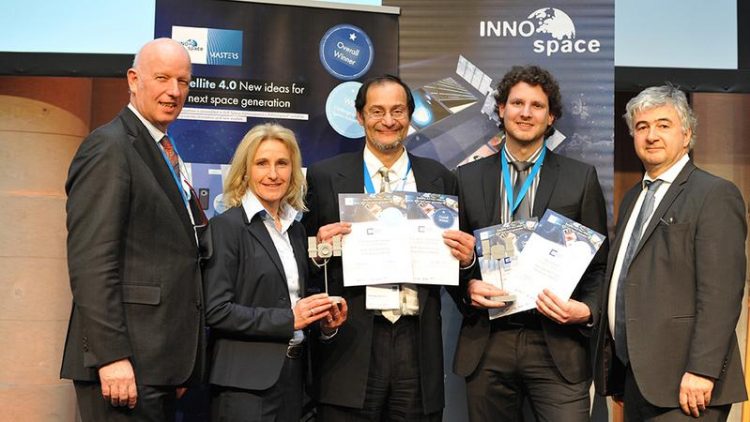The world's first wireless satellite

Sergio Montenegro (centre) and Tobias Mikschl with Wolfgang Scheremet, Federal Ministry for Economic Affairs (right), and Gerd Gruppe and Franziska Zeitler, both from the DLR Space Administration. (Photo: DLR / Simone Leuschner)
Professor Sergio Montenegro and his fellow researcher Tobias Mikschl have reason to be happy: A few days ago, the two computer scientists from the Julius-Maximilians-Universität (JMU) Würzburg in Bavaria, Germany, took to the podium in Berlin – as the overall winners of the INNOspace Masters competition and as winners of the category “DLR Space Administration Challenge”. DLR is the national aeronautics and space research centre of the Federal Republic of Germany.
What the price was awarded for: Montenegro and Mikschl developed Skith, a technology for the world's first wireless satellite. Previously, all single components of a satellite had to be interconnected using electric cables. Skith has changed that by using miniaturised high-speed real-time radio modules with short ranges. This reduces design effort and costs while boosting the satellite's technical reliability and flexibility.
Test in space planned for 2018
“The system is ready and waiting in our labs to be tested in space under real conditions,” says Mikschl. In 2018 already, Skith could hitch a ride on a satellite to be launched into space, allowing the system to prove how well it functions under real conditions.
Skith stands for “skip the harness”. As a reward for their innovation, Montenegro and Mikschl received a certificate, a satellite-shaped trophy and the invitation to apply for money with the DLR to fund new projects.
Facts about the competition
The DLR has organised the competition for the first time. Under the motto “Satellite 4.0”, participants were invited to submit suggestions and concepts for the future of aeronautics. 50 companies, universities and research institutions from eight European countries participated. In the end, nine finalists in three competition categories convinced the jury with their ideas. The awards ceremony took place at the INNOspace Masters Conference in Berlin on 4 May 2016.
The competition is organised by DLR Space Administration on behalf of the German Federal Ministry for Economic Affairs and Energy. The competition is part of the INNOspace initiative that has promoted innovations and technology transfers between astronautics and other industry sectors since 2013.
Contact
Prof. Dr. Sergio Montenegro, Head of the Chair of Computer Science VIII (Information Technology for Aerospace), University of Würzburg, montenegro@informatik.uni-wuerzburg.de
Tobias Mikschl, Chair of Computer Science VIII (Information Technology for Aerospace), University of Würzburg, Phone: +49 931 31-80031, tobias.mikschl@uni-wuerzburg.de
http://www.dlr.de/dlr/en/desktopdefault.aspx/tabid-10212/332_read-17704/#/galler… DLR press release on the competition
http://www8.informatik.uni-wuerzburg.de/startseite/ Link to the homepage of Prof. Dr. Sergio Montenegro
Media Contact
All latest news from the category: Information Technology
Here you can find a summary of innovations in the fields of information and data processing and up-to-date developments on IT equipment and hardware.
This area covers topics such as IT services, IT architectures, IT management and telecommunications.
Newest articles

Machine learning algorithm reveals long-theorized glass phase in crystal
Scientists have found evidence of an elusive, glassy phase of matter that emerges when a crystal’s perfect internal pattern is disrupted. X-ray technology and machine learning converge to shed light…

Mapping plant functional diversity from space
HKU ecologists revolutionize ecosystem monitoring with novel field-satellite integration. An international team of researchers, led by Professor Jin WU from the School of Biological Sciences at The University of Hong…

Inverters with constant full load capability
…enable an increase in the performance of electric drives. Overheating components significantly limit the performance of drivetrains in electric vehicles. Inverters in particular are subject to a high thermal load,…





















